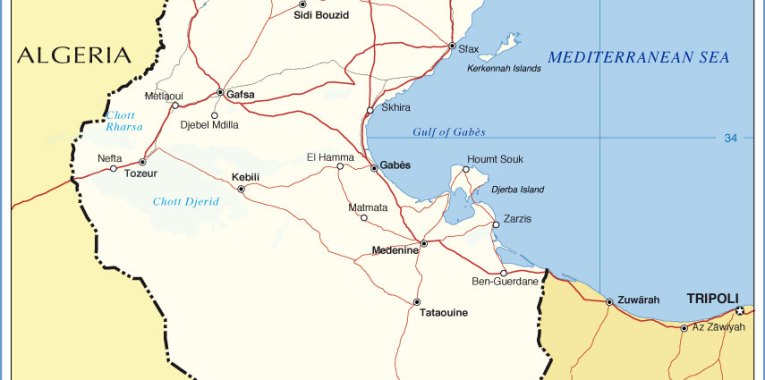In Tunisia true diversity within political Islamism exists. While some followers, such as Salafists, may hold puritanical views that date back to the practices of early historical Muslims, others support the idea of a moderate Islamic State – where Islam influences the law, but does not literally dictate it. Salafism is a conservative offshoot of Islam that is continuing to gain momentum in Tunisia. Most Salafists believe that a modern Islamic state should still follow strict Sharia law. However, followers of Salafism differ on their beliefs of how one should go about accomplishing this.
Under Ben Ali’s regime the Tunisian government had violently repressed Islamists. In particular, Ben Ali’s anti-terrorism law of 2003 led to thousands of arrests and cases of torture. In addition, Ben Ali’s neoliberal policies had created high rates of unemployment and poverty, especially among the youth who became disaffected with the political authorities, refusing any participation in politics. After the fall of Ben Ali, with the objective of reclaiming their identity, many young Tunisians, men and women, became radicalised through self-investigating their previous experiences of subjugation by the old regime. In other words, instead of legitimising the existing identity imposed on them by the dictator Ben Ali, many Tunisians decided for themselves what image they wanted to identify with and consequently defend. Hence, paradoxically, by continuously repressing Islam in the political as well as public sectors, the Tunisian government fostered the creation of a new and more extreme form of Islamism.
Able to freely articulate their Salafi identity and not yet having generated enough experience to question the validity and the applicability of their new ethical truth, radical youth became very concerned with the stylisation as well as the practical implementation of their new identity. Thus, while men raised beards and changed their praying methods, women started wearing the Niqab and stopped shaking hands with men.
However, by late 2013 and early 2014, Salafis once again became the target of security forces, and were subject to unlawful persecution and imprisonment. Freedom of public engagement and activism became increasingly restricted. As a response to state repression and interpersonal experiences within the Salafi community, many young Tunisians started to question their radical Salafi identity. Not only did they question the role of the state and its security apparatuses in inflaming violence; they also questioned the dangers of the jihadi strategy itself. They started to challenge the trustworthiness of Jihadis and criticised the negative effects jihadi strategy had on their Salafi identity.
Dr. Aitemad Muhanna-Matar conducted research into the radicalization and de-radicalization experiences of Salafi Youth in Tunisia through a series of interviews. Notably, it was not a change in government policy nor help from NGOs that resulted in their de-radicalization, but rather from their own involvement with jihadi groups. One male interviewee stated that he started to rethink the politics of Salafism after he felt threatened from within jihadi organizations as a result of his unwillingness to engage in violence. A female interviewee who was arrested for supporting jihadists began to distance herself from Salafis when they failed to support her on her return from prison.
What is important to note is that the de-radicalization of Salafi youth in Tunisia came from within. Only from personal reflection on their participation with other radicalized individuals and their engagement with radical ideas could they de-radicalize. However, this reflection was not a purely individualistic task – it was deeply connected with other radical Salafis, and was dependent on the changing social and political context.
State-led rehabilitation is often the chosen approach by governments for de-radicalization. Such efforts often fail given the reliance on faulty assumptions, just as in the case of Saudi Arabia’s. Erroneous generalizations that radical youth are vulnerable and incapable of thinking rationally leads to an ineffective strategy of state intervention. Radicalized youth can circumvent state rehabilitation to get released. State intervention instead drives radicalized groups underground, leading to the opposite outcome. Fear of government crackdowns against those that do not adhere to a state sponsored interpretation and vision of Islam stifles the freedom to experiment with alternative means of political engagement.
Instead of state-led rehabilitation, a more effective strategy for rehabilitation into society is to avoid isolation and promote engagement with the public. This can be done by encouraging de-radicalized Salafists to be involved in public activism. There should be a balance of power in the religious sphere that allows all non-violent religious actors a voice, including de-radicalized Salafis. In turn, these de-radicalized Salafis can share their experience of de-radicalization with others through state and non-governmental platforms. The coordination of both government and NGO actors can ensure a more cooperative approach to counter extremism that includes the knowledge and understanding of individuals who were previously involved in radical groups. By moving away from the wrongful assumptions that radicalized youth are vulnerable and incapable, they can be provided with the opportunities to critically reflect on their Islamic identity.
Anne Siebenaler and Marina Zabelina are editors of the Education Policy Centre at King’s Think Tank.

